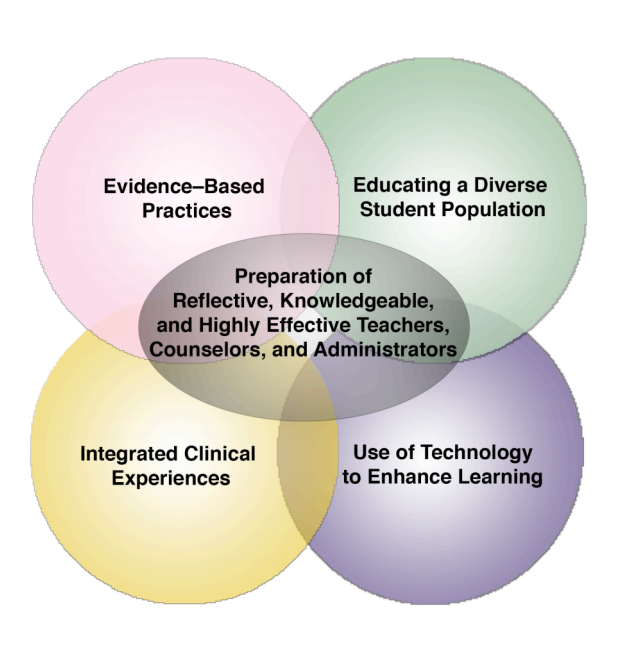Conceptual Framework
Hunter College Mission (excerpted from official text)
Hunter College is a comprehensive teaching, research and service institution, long committed to excellence and access in the education of undergraduate and graduate students in the liberal arts and sciences, as well as in several professional fields: education, health sciences, nursing and social work. The goal of a Hunter College education is to encourage the fullest possible intellectual and personal growth in each student. While preparation for specific careers is an important objective of many programs, the fundamental aim of the college experience as a whole is to develop a student’s rational, critical and creative powers. It includes a broadening and deepening of outlook: an awareness of one’s own and other cultures as well as of the enduring questions and answers concerning being, purpose, and value that confront humanity. Finally, the educational experience at Hunter is intended to inspire a zest for learning as well as to bring the recognition that learning is pleasurable and knowledge is useful.
School of Education Mission
The Hunter College School of Education is dedicated to the preparation of deeply thoughtful, knowledgeable and highly effective teachers, administrators and counselors. Our commitment is to educating these candidates — future professionals who will make a significant impact on the academic achievement, as well as the intellectual, social and emotional development of their students.
Vision Statement
We envision a School of Education in which candidates are immersed in research-based, clinically grounded, culturally competent and technology-rich programs. We are focused on enabling these candidates to achieve substantive learning gains for the students and schools they will serve.
Goal
Our goal is to prepare candidates who will demonstrate, through their professional commitments and practices, those multiple competencies that promote effective learning.

Evidence–Based Practices
The School of Education grounds its course content in the best field-based research and practice. Faculty review findings from their respective disciplines to provide our candidates with the strategies needed for effective instruction. Our candidates master the theory and practice of effective pedagogy in their subject areas, and acquire the tools for reflection on and improvement of their professional work. They achieve a solid foundation in the history, philosophy, psychology, sociology and methodology of education that enriches their teaching. Candidates gain expertise in analyzing and using assessment of student performance to guide their instruction and create optimal learning environments for students.
Integrated Clinical Experiences
The School of Education ensures that its candidates understand and experience the realities of school contexts. We establish strong connections with partnering schools in New York City and surrounding areas. We provide extensive fieldwork with supportive supervision in these schools. Our candidates engage in carefully sequenced and comprehensively assessed clinical experiences prior to their graduation.
Educating a Diverse Student Population
The School of Education provides its candidates with the critical skills and understanding necessary to be responsive to the multiple challenges of all learners: students with a wide range of backgrounds, cultures, abilities and prior knowledge. We teach candidates to create humane and ethical learning communities in their classrooms and schools. They gain the ability to collaborate successfully with parents, families, community members, school faculty and staff in order to provide this support.
Use of Technology to Enhance Learning
The School of Education prepares candidates with the practical and theoretical knowledge of effective and judicious uses of technology in a variety of school settings and for a broad spectrum of learners. Formative and summative assessments of our candidates’ technology competencies are a critical component of preparing them for tomorrow’s schools. We believe that appropriate uses of educational technology enhance learning, assessment and communication.

